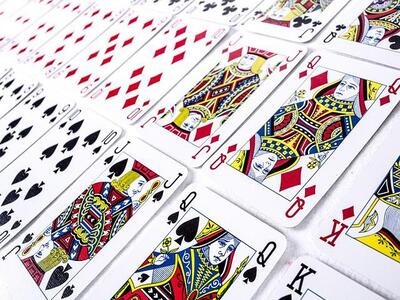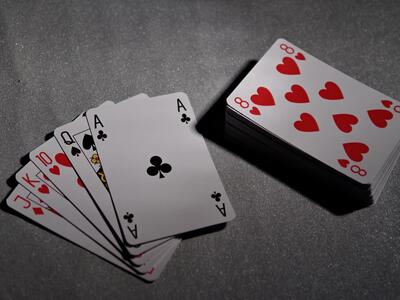Poker Fish: what is a fish and how to spot them?

Table of content:
- Fish hooks in poker
- Instructions to recognize a fish playing poker
- You've distinguished the fish – now what do you do?
- FAQ's
In poker, a "fish" is a player who is simply not a good player.
In this article, we will be explaining the fish poker term including the tendencies of a fish poker player along with fish poker definition.
The objective of any poker player is to play in a game where there is one or various "fishes" present. Playing against a "fish" extraordinarily upgrades your odds of bringing in cash, as they will probably make wrong actions and radiate glaring tells, which can be utilized by the remainder of the players.
Here are some of the things that a poker fish will generally do at the table:
1) Play unnecessarily close.
2) Ignore pot chances.
3) Give off tells.
4) Limp an excessive lot.
5) Ignore the intensity of position.
Nowadays, poker fish are more diligently and elusive, because of the bounty of showing material on the Internet.
Nevertheless, if you play poker, you would prefer not to be known as a "fish".
A fish playing poker is a player that probably doesn't have a lot of involvement and is inclined to losing pots.
A fish will reliably make faulty and foolish plays, and will probably observe their bankrolls contract rapidly while playing at a table for certain excellent players.
Experience the excitement of online poker on our platform, offering a variety of games and tournaments designed to elevate your gaming experience
GetMega is an amazing platform that lets you play Hold'em Poker with friends & family with real money. Sounds fun, isn't it? Download the GetMega Hold 'em Poker now!
Fish hooks in poker
Fish hooks poker is a slang poker name for getting dealt pocket Jacks in Hold'em. The explanation is straightforward, Jack is hook formed, like a fish hook. There is no essential significance to the term of fish hooks poker, however, we may often feel left out of a poker discussion if we aren't acquainted with the terminologies.
It's regular in Texas Hold'em to give particular nicknames to beginning hands. The nickname for pocket Jacks is "fishhooks" with no uncertainty in light of the fact that the bent finish of each Jack resembles a hook. Another explanation anyway is on the grounds that JJ is frequently sufficiently able to beat a "fish" (more fragile player), particularly when making an overpaid.

Instructions to recognize a fish playing poker
1) Calling as far as possible
In case you're not exactly sure what to do, the simple alternative is to find the fish playing poker player is to take cues from another person. That is the reason you'll discover a ton of poker beginners calling each wager, paying little heed to their beginning hand
2) Under-betting and over-betting
Watch out for this, note it down in the event that it occurs and exploit later. For instance, you're in a Rs.1000 Sit and Go online when a player places 1,000 chips under significant pressure with just 10/20 blinds to get. Everybody folds and he uncovers jacks. Presently, it's not the least demanding hand to play, but rather was it worth gambling 1,000 chips to take 30? Most likely not, particularly now you realize how to play him later on.
3) The show-off
A few people can't help themselves. They show each bluff they make, each pot they rake, and continue to indicate hands when they essentially don't have to. This looks like exceptionally off-putting conduct. All things considered, poker's a game that depends vigorously on data. So why part with it with the expectation of complimentary when you don't have to?
4) The showdown
The showdown is the lone rigid data that you get in a round of poker. What two cards was your rival playing? Also, what did his wagers mean? You don't need to be in the hand to get imperative data like this. This is the ideal opportunity to get the edge against your opponent(s) and in the event that you would, you'll be able to be a victor against them over the long haul.
5) Chatterbox
Some fair online players utilize the online chat box to make a bogus impression or put an adversary on tilt. Yet, you can wager the only remaining dollar in your record that anybody composing in 'nh' ('nice hand') or 'wp' ('well-played') when somebody shows aces, he is a powerless player, that is, he is a fish playing poker, regardless of how decent their conclusion.
6) The critic
Awful players like to make themselves look great by investigating every other person. In any case, the truth of the matter is that you need to be facing terrible players and you don't need these awful players to know that they're awful players. Else, they may leave the table – taking their cash with them – and you certainly don't need that!
7) All-in
Fish playing poker players don't care for playing poker after the flop, since it includes unmistakably more expertise. So, keep an eye out for a rival who demands pushing in with no reservations all-in in each hand, pre-flop or something else, when the blinds are still moderately low. Particular utilization of the all-in, with no reservations move can be a ground-breaking weapon. A lot of it is poker self-destruction.
8) Position
Position is key in poker however it's a serious precarious idea to get a handle on when you're beginning. So here are the essentials; pay special mind to individuals who reliably limp in under significant pressure and afterward call a raise just to check and overlap to any wager on the flop. Also, pay special attention to individuals who don't utilize the button to wager and take the blinds.
9) One on one
In the event that you play an awful player 1 on 1, out of nowhere their fledgling status is amplified. You'll before long understand that, maybe in light of the fact that they're apprehensive or just haven't been in the present circumstance previously, they scarcely ever raise, give you heaps of free cards and possibly wager out when holding premium hands. So, except if you're holding a beast yourself, you can simply fold and hang tight for a superior position.
10) Betting
Try not to get anxious with your opponent(s) in the event that they continue committing rudimentary errors. Observe and exploit. Remind them to place their blinds in, reveal to them how much the base wager or raise is

Also Read
You've distinguished the fish – now what do you do?
Try not to attempt to feign them. They'll call you with anything and in case you're feigning their 'anything' could be significantly more than your 'nothing'. You may need to stand by until you hit a hand however remember that; good things come to those who wait!
Get benevolent with them. In case you will take all their cash and anticipate their return, you should cause them to have a positive outlook on themselves. How? Turn on the appeal, something like, 'Wow you played truly well, you just got truly unfortunate,' should work a treat.
Make them pay when you have a major hand. In case you're certain you have the triumphant hand you need to heartlessly extricate whatever number chips from them as could be allowed. Try not to frighten them away with a major wager, however put your cash in on the off chance that you think they'll call. Try not to check on them in expectation that they bet into you.
Very aloof players are considerably more liable to take cues from you – you check, they'll check; you stick in chips, they'll stick in chips. Additionally, in the event that you haven't got a lock on the pot don't allow them to attract to a triumphant hand. There's nothing more irritating than losing to a fish on the river.
With this, we come to the end of the discussion of the term poker fish (two fish hooks poker), now you are aware of yet another poker term. Why not try a game of poker? Download the GetMega Poker app now and enjoy playing with your friends!
GetMega is an amazing platform that lets you play Hold'em Poker with friends & family with real money. Sounds fun, isn't it? Download the GetMega Hold 'em Poker now!
FAQ's
What is a poker fish?
- A poker fish is an inexperienced or weak player. They make predictable moves and lack strategy. Spot them by observing passive play, frequent mistakes, and a tendency to chase losing hands.
How do I identify a poker fish at the table?
- Look for signs like overvaluing hands, playing too many starting hands, and erratic betting. Fish may also show emotional reactions to losses, giving away their inexperience.
Are all beginners considered poker fish?
- Not necessarily. Beginners may become skilled players with time. Fish, however, persist in making fundamental mistakes. Watch for consistent errors and a lack of adaptability to distinguish them.
Can a poker fish be an advantage to skilled players?
- Yes, skilled players exploit fish for profit. They capitalize on predictable behavior, making strategic decisions to exploit weaknesses. Patience and understanding opponents' tendencies are key to profiting from fish.
How can I avoid being labeled as a poker fish?
- Educate yourself on poker strategy, starting hands, and position play. Avoid common mistakes, like playing every hand or chasing losses. Stay composed, observe opponents, and adapt your strategy to appear more experienced at the table.
| Title | Slug |
|---|---|
| Pocket in poker | pocket-in-poker |
| The Term Flip In Poker | the-term-flip-in-poker |
| Tell in Poker | tell-in-poker |

